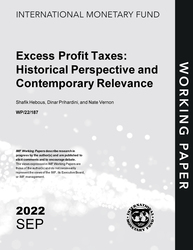
Excess Profit Taxes: Historical Perspective and Contemporary Relevance
Excess Profit Taxes: Historical Perspective and Contemporary Relevance
READ MORE...
Volume/Issue:
Volume 2022
Issue 187
Publication date: September 2022
ISBN: 9798400221729
$20.00
Add to Cart by clicking price of the language and format you'd like to purchase
Available Languages and Formats
| English |
Prices in red indicate formats that are not yet available but are forthcoming.
Topics covered in this book
This title contains information about the following subjects.
Click on a subject if you would like to see other titles with the same subjects.
Labor , Economics- Macroeconomics , Public Finance , Economics / General , profit shifting , profits tax , com petition , profit tax , excess profits , Corporate income tax , Allowance for corporate equity , Non-wage benefits , Corporate taxes , Global
Summary
This paper discusses the design of excess profits taxes (EPTs) that gained renewed interest following the COVID-19 outbreak and the recent surge in energy prices. EPTs can be designed as an efficient tax only falling on economic rent, like an allowance for corporate capital, and drawing some parallels with current proposals for reforming multinationals’ taxation. EPTs can be permanent or temporary as an add-on to the corporate income tax to support revenue during an adverse shock episode. The latter reflects experiences with EPTs during and after the World Wars. Different from that era, though, profit shifting is now a challenge. Estimation using firm-level data suggest that, at present, locations of excess profit across countries are consistent with profit shifting practices by multinationals. Destination-based EPTs can address this concern. Estimates suggest that a 10 percent EPT on the globally consolidated accounts of multinationals (on top of the current corporate income tax), with the EPT base being allocated using sales, raises global revenue by 16 percent of corporate income tax revenues. The analysis suggests that international coordination would be desirable to mitigate the risks of profit shifting and tax competition. Eventually, EPTs could mark an evolution of corporate taxation toward a non-distortionary rent tax.
Copyright © 2010 - 2026
Powered by:
AIDC



